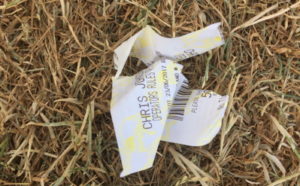What Is A Bankroll? How Big Does It Need To Be?
 Read any betting or gaming strategy and you’ll read pieces by people that talk about a bankroll. To those that don’t know a huge amount about gambling, the idea of a bankroll might seem entirely foreign. What does it mean? Why does it matter? In essence, a bankroll is the amount of money that you have available to you to place bets with. For the disciplined punter, once the bankroll is gone, the betting stops.
Read any betting or gaming strategy and you’ll read pieces by people that talk about a bankroll. To those that don’t know a huge amount about gambling, the idea of a bankroll might seem entirely foreign. What does it mean? Why does it matter? In essence, a bankroll is the amount of money that you have available to you to place bets with. For the disciplined punter, once the bankroll is gone, the betting stops.
That’s why you need to know how big your bankroll needs to be before you start betting, with a good rule of thumb being that the size of your bankroll is inline with how big the wagers are that you’re placing. If you bet £1,000 every day, for example, you’re going to need a bigger bankroll than someone placing £5 bets on a weekly basis. Figuring out how you bet is the first place to start when putting your bankroll together.
What Is A Bankroll?

Let’s start by defining what it is that we’re talking about when we use the word ‘bankroll’. It isn’t on a list of exciting words when discussing betting, but it’s arguably the most important one that there is because it not only allows you to keep betting for longer but also to know whether you’re up or down with your wagers. When you’re betting, you need to have a sense of how much money you’ve got to bet with.
There are plenty of bettors out there who will simply move money from the current account into their betting account and place wagers on the fly. When the money in their betting account runs out, it’s back to the current account they go, shifting more money over to place their next wager. It is entirely possible that you’re reading this and feeling as though we’re writing about you, but is that a sensible way to operate?
How would the people working like this ever know how much money they’ve won or lost thanks to their betting? Do they have any clue how much they’ve moved from their current account to their betting account? The best way to operate is to set aside an amount of money that you’re going to be betting with and make a note of how much money that is. That is your betting bankroll and managing it is crucial to your success.
One of the things to think about is that your bankroll doesn’t need to be massive if you don’t have much money. It’s not that everyone who bets has to have tens of thousands of pounds in their betting account to cover any losses. Instead, it’s about having a bankroll available to you that is proportionate to the amount that you’re going to be betting. Or, to put it another way, you should place bets that are proportionate to your bankroll.
Managing The Bankroll
 Whether you’re playing poker, hitting the roulette table or sitting down to place some bets on Premier League football, knowing how to manage your bankroll is a vital part of a bettor’s road to success. It doesn’t mean that you’ll win every wager that you place, but it does mean that you’ll have a good sense of when you’re up, when you’re down and when you need to think about replenishing your bankroll.
Whether you’re playing poker, hitting the roulette table or sitting down to place some bets on Premier League football, knowing how to manage your bankroll is a vital part of a bettor’s road to success. It doesn’t mean that you’ll win every wager that you place, but it does mean that you’ll have a good sense of when you’re up, when you’re down and when you need to think about replenishing your bankroll.
One of the key phrases to remember when it comes to betting is ‘variance’. This is, in simplistic terms, the manner in which how much money you win or lose can go down as well as up during your time betting. A bankroll allows you to cope with the swings and arrow falls of variance, meaning that you don’t need to panic if you suffer a series of losses all in a row, knowing that you have a cushion to protect you.
Managing your bankroll is about placing bets that you can afford to lose whilst also ensuring that the stakes that you place fit in with the size of your bankroll. If, for example, you can only afford to put £100 into your bankroll then you’d be silly to be placing bets of £20 every time you login to your bookmaker’s website. Work like that and it won’t be long before your bankroll has been all but wiped out.
Track Your Betting
 One of the key parts of bankroll management is to track your bets. The best advice we can give is that you pause from reading this article right now and open up a spreadsheet. Put the amount of money that you’re going to have available as your bankroll at the top, then make sure that you make a note of every single bet that you place from now on.
One of the key parts of bankroll management is to track your bets. The best advice we can give is that you pause from reading this article right now and open up a spreadsheet. Put the amount of money that you’re going to have available as your bankroll at the top, then make sure that you make a note of every single bet that you place from now on.
Put down the starting amount of your bankroll, the size of the bet and the odds that you took.
It might look something like this:
| Amount | Bet | Odds | W/L |
|---|---|---|---|
| £1,000 | £50 | 3/1 | L |
| £950 | £20 | 4/1 | W |
| £1,030 | £40 | 2/1 | W |
| £1,110 | £20 | 3/2 | L |
This is how to manage a bankroll successfully, knowing how much money you’ve won or lost with each wager that you’ve placed. It allows you to ensure that you’re not losing track of how much money you’ve used up in bets as well as to stop yourself from going beyond the limit that you’ve put in place on your wagering. When it comes to putting said limit in place, percentage betting is a good place to start.
Think About Percentage Betting
 One of the best ways to manage your bankroll is to think about percentage betting. That doesn’t mean that you look at the percentage chances of a bet being successful and either place it or don’t depending on that. Instead, it’s about betting a percentage of your bankroll each time you decide to place a wager. It is good practice to think about a bet of between one and five percent of your bankroll and going from there.
One of the best ways to manage your bankroll is to think about percentage betting. That doesn’t mean that you look at the percentage chances of a bet being successful and either place it or don’t depending on that. Instead, it’s about betting a percentage of your bankroll each time you decide to place a wager. It is good practice to think about a bet of between one and five percent of your bankroll and going from there.
Let’s imagine that you’ve got your bankroll together and it is £1,000. If you were to place a 3% bet each time you had a wager on something, you’d be betting £30. That would give you a little over 33 losing bets in a row before you bankroll ran out, presuming that you don’t adjust your bet each time. Whilst it wouldn’t allow you to bet forever, if you’ve placed 33 wagers, lost them all and are £1,000 down, it might be worth considering giving up betting anyway.
If you know that you’re allowing yourself 3% of your bankroll towards your bets, you know exactly how much you’ve got to play with. You can then split that £30 up however you want. Perhaps you’ll have a £5 bet on a Premier League match, a £10 Each-Way wager on a horse race, a £1 accumulator on the Championship and a £4 Straight bet on the winner of the Ryder Cup, for example.
What you’re betting on doesn’t matter as much as knowing how much you’re able to bet whilst still being within your allotted amount of money. You could lose all of your bets, but it would be unlikely unless you’re terribly unlucky or not a very good bettor. Instead, what’s more likely is that you’ll lose some of them and win others. Let’s say that at the end of the weekend you’ve received £50 back in winnings and returned stakes.
That means that your bankroll is now up to £1,020. You can continue to bet with the 3% of the £1,000 bankroll, or you can adjust your bet to include your new winnings. That’s entirely up to you, but it’s something that you’ll want to think about before you engage in your betting so that you stick to your promise to yourself. Similarly, do you want to use any winnings as a ‘free hit’ or include them in your bankroll figure?
One of the best ways to manage your bankroll is to set a limit on how much you’re allowed to bet over your chosen period of time. That is to say, if you’re someone that wants to bet 3% of your bankroll every week, you can ask your betting company of choice to only allow you to place £30 of bets every seven days. Once your £30 is up and spent, you can no longer place any other bets and will have to see where you’ve landed.
How Big Does You Bankroll Need To Be?

There are a couple of things that will dictate how big your bankroll needs to be, with the first one being what you can actually afford. It’s all well and good wanting a bankroll of £1,000, but if you’ve only got £300 in disposable income then you’re going to struggle to get it together. The most important thing to remember about your bankroll, if not betting in general, is that you should only bet what you can afford to lose.
The reality of betting is that it is a complicated world that will often see people lose vast sums of money on a ‘sure thing’. We’ve all been in front of a roulette table and seen it come up red 14 times in a row, so we’ve lumped on black only to see red come up for the 15th time in succession. Liverpool went 44 Premier League home matches without defeat, so when they lost to Burnley many people placed big sums on them bouncing back in their next game at Anfield. They went on to lose six times in a row at home.
That is the variance that we’ve written about elsewhere on this page, with the bankroll of sensible and disciplined bettors covering them from such unexpected losses. Nobody wants to lose, but losing is an inevitability in the world of gambling and so it is one that we need to prepare for. If you can afford to lose £1,000 and have it available, that can be your bankroll. If you can only afford to lose £50, that should be your bankroll. That’s the way of thinking about it.
Outside Bets Need A Bigger Bankroll
 If you’re only ever betting on ‘sure things’ with low odds, the chances are that you’ll win on a fairly regular basis. There will still be some losses sprinkled in there for the simple reason that there is no such thing as a ‘sure thing’ in betting, but generally speaking you’ll win more than you lose. As a result, you don’t need a massive bankroll because you’ll be getting your money back more often than you’re losing it.
If you’re only ever betting on ‘sure things’ with low odds, the chances are that you’ll win on a fairly regular basis. There will still be some losses sprinkled in there for the simple reason that there is no such thing as a ‘sure thing’ in betting, but generally speaking you’ll win more than you lose. As a result, you don’t need a massive bankroll because you’ll be getting your money back more often than you’re losing it.
If, on the other hand, you’ve decided to make outsider bets the thing that you look for then you’re going to need a bigger bankroll. Bets with long odds will pay more in winnings, but there’s a reason why they’ve got long odds and it’s not because bookmakers are stupid. Instead, it’s because they know that the chances of the thing you’re betting on winning are quite long, which means that you’ll lose more bets than you win.
If you’re losing bets on a regular basis, it goes without saying that you’ll need a bigger bankroll to cope with your losses. When the wins come in they will boost your bankroll back up again, but the whole point of this risky strategy is that you need to be able to absorb losses regularly in order to get to the point where you’re winning. That is bankroll management in a nutshell: absorbing losses to allow you to get to the wins.
Ultimately, it is all about personal choice. Only you will know how much you can afford to lose, should every single bet you place turn out to be a bad one. This will give you your bankroll amount, from which you’ll be able to work out how much of a percentage of your bankroll you should bet with each time you place a wager, based on what your overall betting strategy will be. Stick to that and you’ll have a more enjoyable betting experience.



